The pain became a corrosive substance
Even people like this

Today Bill Shaner reports on Massachusetts Governor Maura Healey's rather Trumpian approach to addressing migrants and homelessness in the Commonwealth. Read it down below or here:
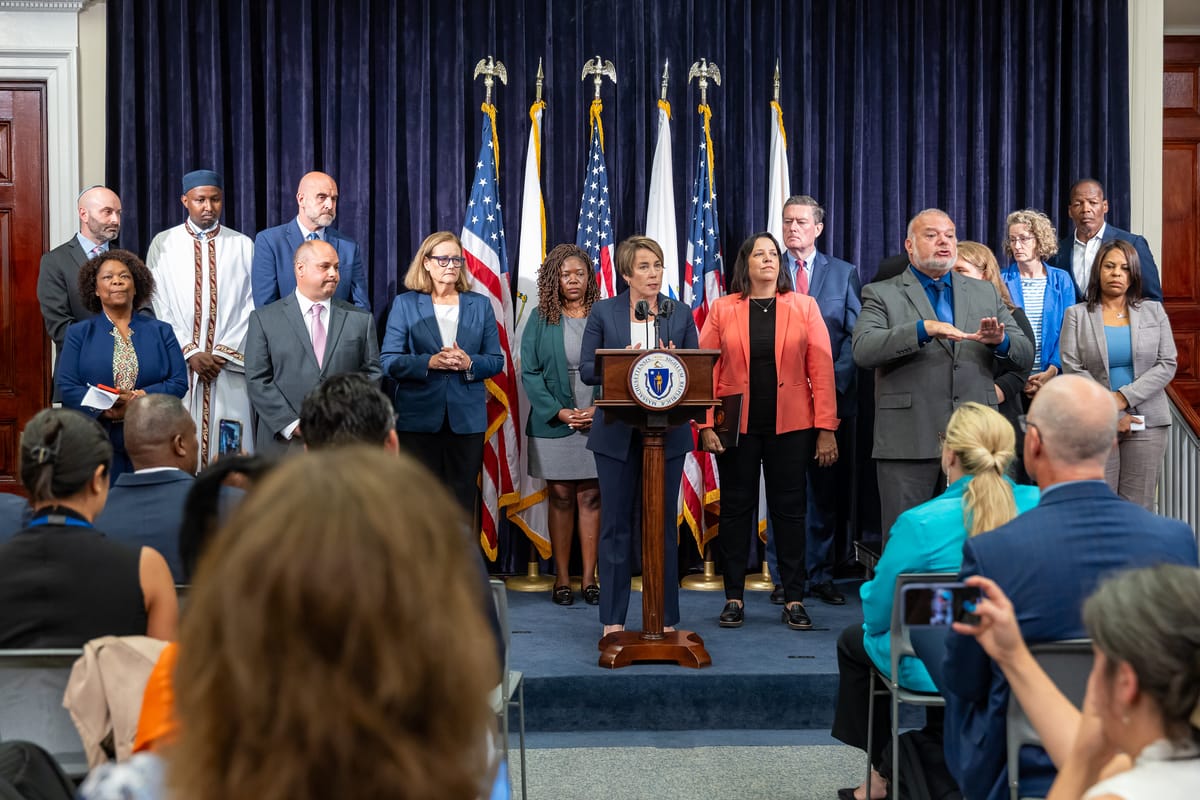
Reduced to its essence, Healey has imposed a set of austerities, for the benefit of the “taxpayer,” and advertised them as efficiencies. She has presented a narrative in which incoming migrants are the chaos agent. She doesn’t call them rapists and murderers like Trump, doesn’t say they’re eating dogs and cats, but she still calls them the problem.
In doing so she’s allowed a pernicious myth to propagate: that immigrants are taking the services intended for our native residents. That they are to blame for the tents people see in the woods here in Worcester and elsewhere. She has not offered a meaningful alternative to this line of thought.
Shaner previously reported for Hell World on a No New Women’s Prisons anti-incarceration march, a strike by nurses at Saint Vincent Medical Center, the cruel displacement of the city's unhoused population, and the Department of Justice investigation into the police department of Worcester, MA.
Coincidentally the DOJ just released that report yesterday. They found the department guilty of a pattern or practice of civil rights violations! You can read it here.
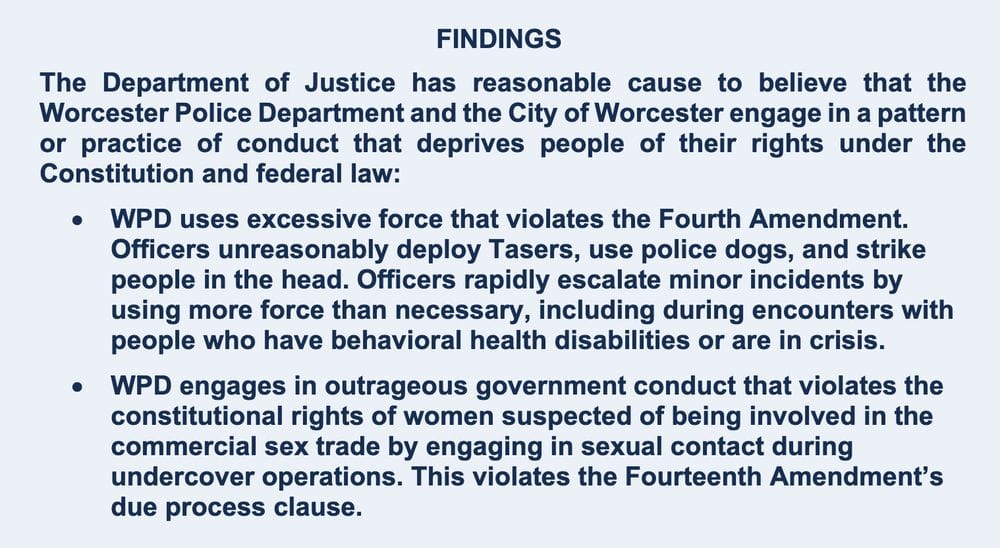
Subscribe to help pay for our freelancers and great local reporting.
Did you get a Christmas tree? We got one on Sunday and so it reminded me of this piece from ACWF which I will now share once again.

It appears that Luigi Mangione the alleged shooter of the UnitedHealth CEO has a wide range of disparate beliefs and no clearly delineated ideology (unlike me the only person with completely coherent politics in the world.) Looking across his reported social media feeds though I couldn't help but think that he seems just like the type of wayward young men who have been drifting further right in recent years that we were all psychoanalyzing in the media after the election.
I did the Leo pointing at the TV move.
Oh hey man we were just talking about you.
In any case what I said here the other day remains true: Regardless of the individual motive the public reaction is what it is.
Something about Americans of all kinds has been made plain here.
A couple of things I wrote last week also remain true and were true before any of this happened.
Everyone in this country has a story about being fucked by their insurance company or knows someone who has. I'm being fucked by mine as we speak! I have been living with debilitating pain that I know is curable and that my doctor knows is curable but that we are both nonetheless being made to wait months to address while some asshole decides if they feel like signing off on it or not.
This is a routine experience in this country. We all know it well.
...
There's an opportunity here to seize on this popular disaffection. It's clear that vast numbers of people in this country despise the predatory healthcare system we have set up to enrich the few at the expense of the many. You would think some Democrats might pick up on that and run with it right?
They still haven't signed off on my procedure by the way.
The fact that he reportedly came from a background of wealth and elite education doesn't change anything either it only further illustrates the destructiveness and cruelty of the health insurance cartel we all suffer under. Even people like this can be ground under its boot.
Maybe the most relevant detail to me is that he is apparently a chronic back pain guy who had had a serious surgery this year that changed him as the New York Times reported.
Fucking up my back lifting when I was young – and looking at this dude it's pretty safe to guess that's what happened to him – is the single most significant event in my life and my various efforts to self medicate the pain over the years will likely lead to my early death lol.
If you've ever lived with chronic back pain like I do you know that it can make the world a very dark place. It isn't just the physical pain – the lightning strikes throughout your nerves or being unable to walk or sit for very long or to get up and down stairs – it takes an intense psychological toll just to continue to exist. And that's all while you're also being made to jump through the hoops and over the barriers that insurance companies erect to prevent your pain from being taken seriously.
I'm reminded of the time M. fell and hurt her back terribly a few years ago and was immobile and in agony for days. We simply could not get the hospital to turn on the fucking MRI. For days we pleaded with them to do it and they said no. Refused to even try to pinpoint what had gone wrong with the machine designed to do so.
Once they eventually relented and saw how badly she had been injured they were like ah shit fuck and got her into surgery the next day. None of that suffering and waiting was necessary. There was no reason for any of it besides someone else's profit.
I guarantee almost all of you have been or know someone who has been through something like that.
And that's before we even get to the mess the industry has made of everything with the opioid crisis of their own design. Treating everyone like drug-seekers instead of human beings. The thing that always strikes me as so perversely shitty about this routine scenario is that the medical people are the ones who helped everyone get addicted to opioids in the first place not me! I'm not a drug addict! (Much quieter voice) uh not that kind.
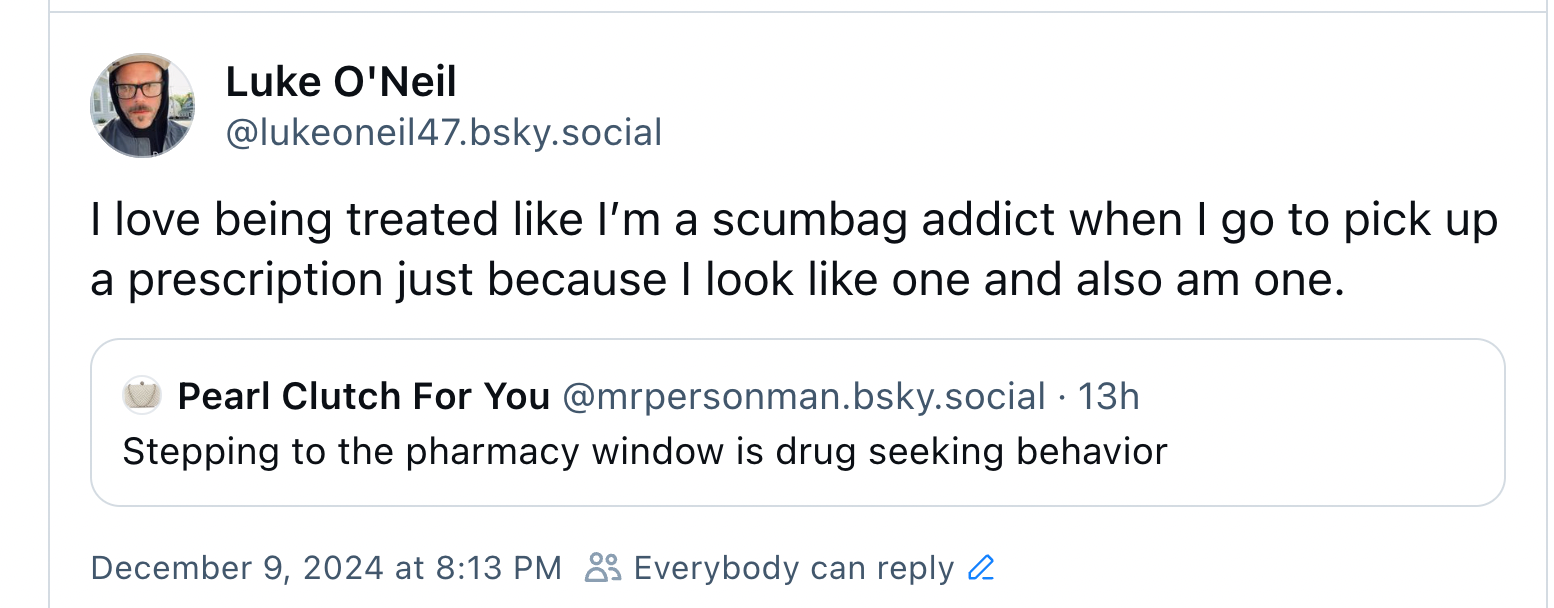
I don't know.
Read this one if you never did:

I went back to the Pain Center yesterday the one I mentioned previously and I filled out the forms they make you fill out every time on that clipboard there Welcome to Pain Management it says which would’ve been another good name for this book.
It’s essentially page after page of a questionnaire asking you about whether or not you’ve ever gotten into trouble for having drugs or if you’ve ever misused your drugs or had encounters with the law due to drugs or if people have ever told you you have an issue with drugs and for most of the answers I answer no because it’s the truth and mostly what they’re interested in are opioids anyway but the real thing they’re trying to figure out here is whether or not you have your pain coming. They are gonna treat you either way but if you’ve already used up your physician empathy points and went and fucked around with medications then they’re not going to treat you as well or as effectively as they might have otherwise. When they see you’ve been addicted to things in the past the doctors just like the cops and the TV news and the readers and the viewers who delight in distancing ourselves from other people who are more deserving of pain than we are think that it’s a just penance.
Another thing they have you do is try to describe not just your degree of pain but also the specific qualities of pain. They ask like is it burning stabbing piercing throbbing dull aching and I don’t know how to answer those things because I never graduated from the Pain Sommelier Academy. I am not equipped with the vocabulary to tease out the subtle notes of pain inside of my own body and I don’t think we’ve all really gotten together and come to a consensus on what the specific difference between any of those terms are have we or did I just miss it? We’re speaking in a language that we don’t understand and that no one else understands and the person who’s trying to interpret it the doctor might as well be imagining a monkey playing the cymbals in his brain while you’re talking which is what they do because your doctor never listens to you anyway.
One thing the doctor said they could do to figure out what’s going on with me is poke needles into the nerves in my back and the front side of my body at the same time and try to see which ones light up or something when they sent a little charge through my body. I think. It’s a very painful procedure he said but I didn’t really listen to what else it entailed because you never listen to your doctor anyway.
Every time I talk to a doctor it’s like I just walked into a room and met nineteen different people at a cocktail reception or something and you know there is no way you are going to remember all of their names or where they’re from or what they do but the people are actually things that are wrong with you. So you try your best to pick out one of them that will stick.
Experiencing pain sometimes is like suspecting there’s a dead mouse in your walls like you can vaguely smell it so you go poking your snout around by the sink and under the stove or wherever and you know you know you know it’s there somewhere but you can’t find it or tell anyone else where to go to pull it out. You know it’s in the kitchen say but that’s as close as you can get to narrowing things down and then you just have to wait for decomposition to take over eventually and in the long run none of it will be there and it will have never been there.
Read this too:
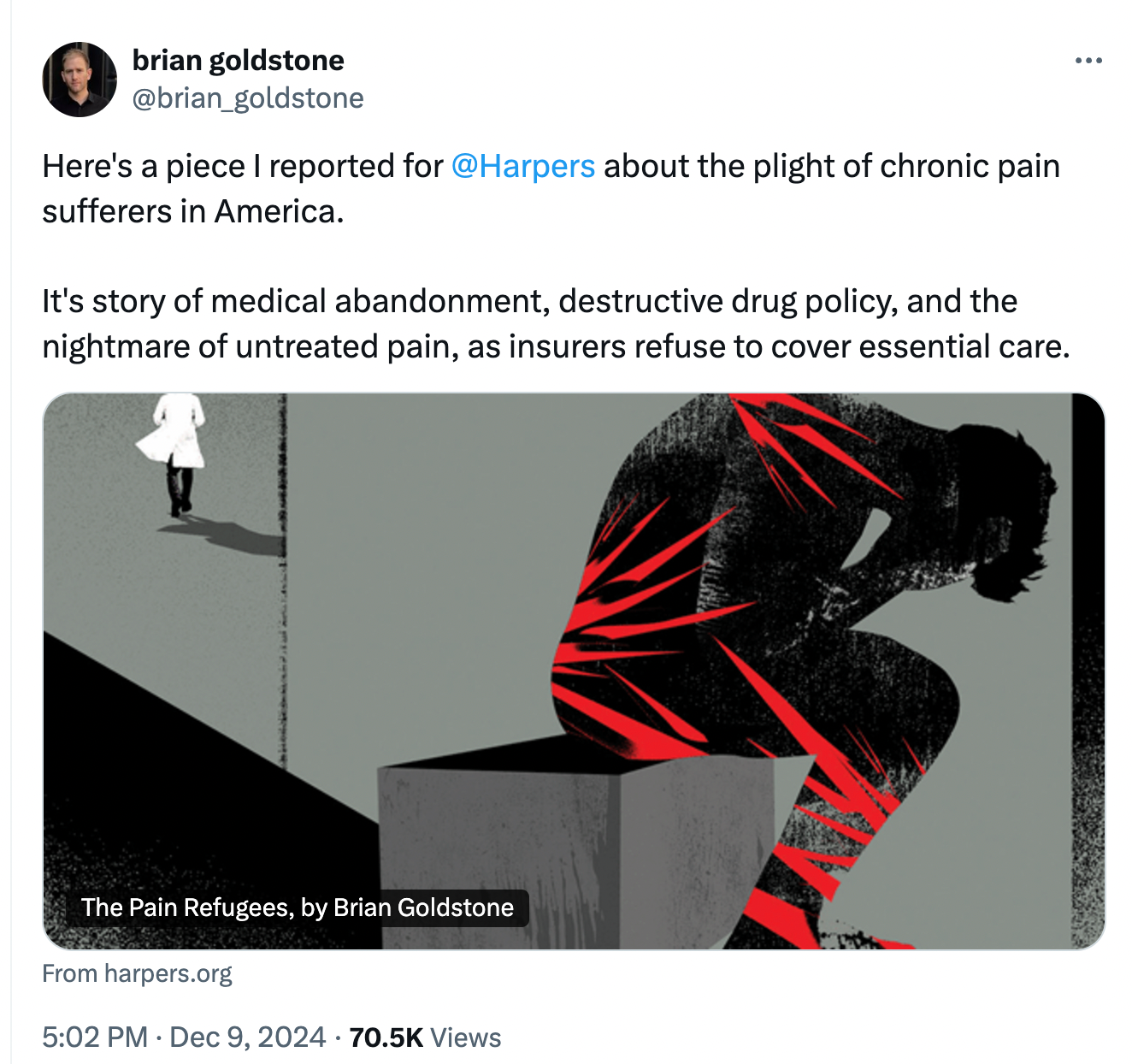
The pain became a corrosive substance, eating away at his career and his marriage. Those closest to him were mystified. “I couldn’t figure out why he was hurting so much,” Mitchell told me. “I know he didn’t understand it either.” Sell’s primary care physician was no less perplexed. He referred him to a neurologist, who in turn referred him to another specialist. Desperate, Sell pursued an exhausting ensemble of treatments. There were epidural steroid injections and medial branch blocks; there was acupuncture and yoga and guided meditation. There were physical therapists, herbal remedies, and over-the-counter medicines. Some of the treatments were excruciating and offered not even temporary relief. Others proved more effective but, not covered by his insurance, were prohibitively expensive. He shuttled from one provider to the next, confused by the contradictory guidance he was receiving, and not sure how much longer he could remain in such a state.
I've personally never been in bad enough pain that I've thought about killing someone else – someone else being a key distinction – but it's not like it's an impossible thing to imagine someone considering.
Ok here's Bill Shaner. Thanks for being here.
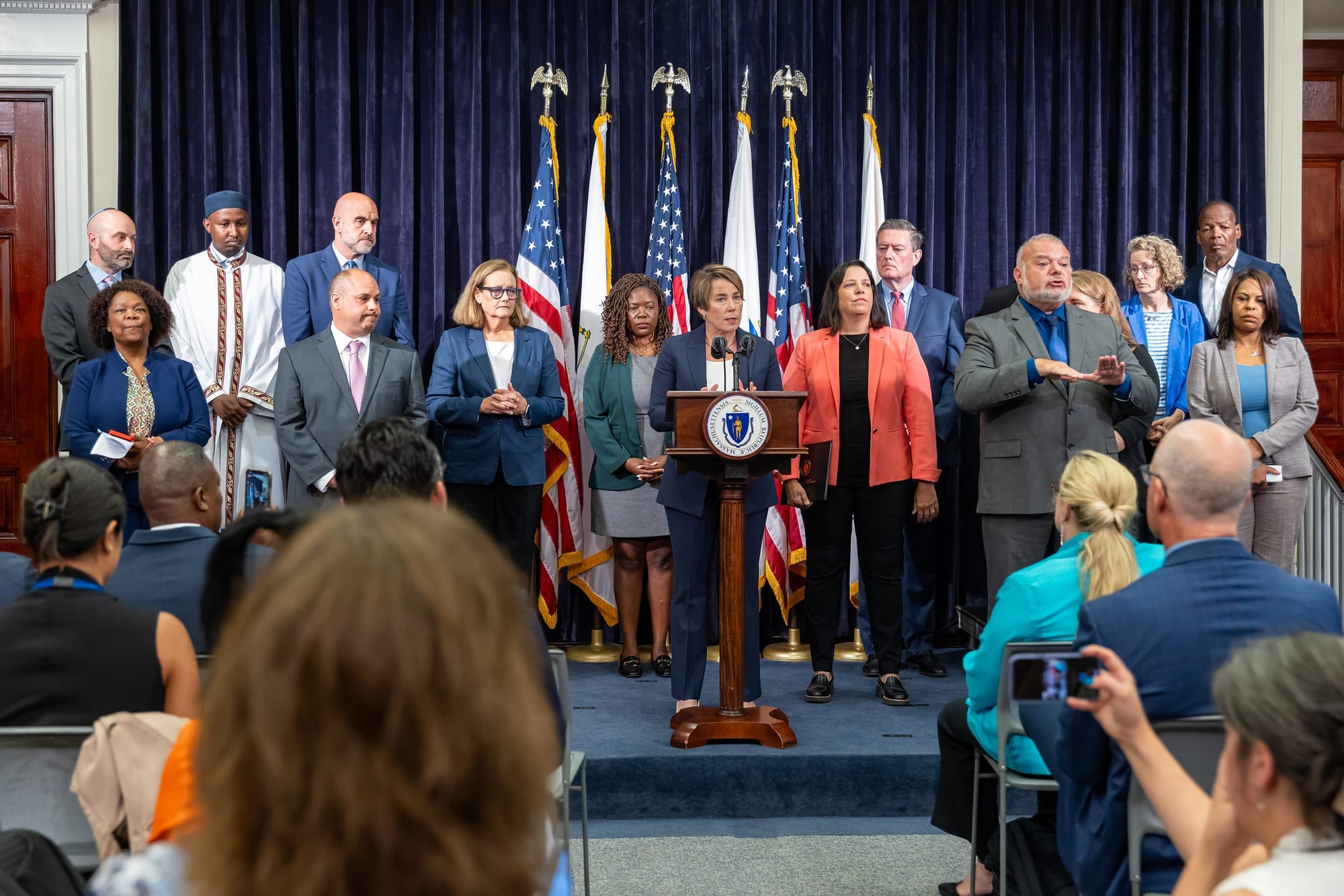
It becomes hard to see the difference
by Bill Shaner
In August of 2023, Massachusetts Governor Maura Healey declared a state of emergency. The “rapidly rising numbers of migrant families,” she announced, are hitting the Massachusetts shelter system in an “unsustainable manner.” The declaration came with a letter to Biden’s director of homeland security. “Simply put, we do not currently have the tools we need to meet the rapidly rising demand for emergency shelter,” it read.
Two months later she signed a package of tax cuts that will cost the state $1 billion annually in perpetuity. The big winners there were the offspring of dead millionaires. Estates worth more than $2 million are no longer taxed as they’re passed down to inheritors. Day traders also made out. But the benefits to normal people were negligible, as per tradition. Renters for instance got about $50 each (conditions apply). Upon announcement, she took a victory lap, embarking on the “Cutting Taxes, Saving You Money” tour.
Within weeks, she also announced cuts to the shelter system, saying “state and local budgets can only stretch so far," and imposed a new 7,500 family cap. It’s a number that the state was guaranteed to hit, and hit quickly. Families in the shelter system had risen from 5,500 to 7,000 in the months preceding. Most of the new arrivals came from Haiti, a country recently thrown into a new round of chaos, another harvest of empire. Their migration is a symptom of longstanding US policies to keep the country in debt and controlled by our chosen warlords. Massachusetts, with its large Haitian diaspora, is a natural destination.
Despite the fact roughly half of the families in the shelter system were still “from here,” the governor’s messaging now had a villain in the form of the “new immigrants,” an inciting incident with the “recent wave,” a conflict, meaning “the strain,” and a protagonist known as the “taxpayer.” Coincidentally, the cost of the system was inching toward $1 billion, the same amount the state had just handed back to the rich in tax cuts. By and large the statewide press glossed over that, and left Healey’s narrative unchallenged – to varying degrees of vulgarity.
In January, Healey, who often brags about having sued Trump more than 100 times as the state’s attorney general, joined eight other governors in penning an open letter to the Biden-Harris Administration, calling for more border patrol agents, more immigration judges, and more asylum claims adjusters. The border, they said, needed fixing.
In March, the state put a 90 day cap on stays in the shelter system. In July, migrant families were banned from sleeping overnight at Logan Airport. Dozens of families were moved from the airport to a former jail in Norfolk, prompting heated protest from nearby Townie Whites.
In July, Healey appeared on Boston Public Radio. A caller asked why migrant families are getting all this support while he’s from here and he’s on a section 8 waitlist. Healey didn’t confront the premise. “It has put a strain on us,” she said. The host asked her about recent stories of migrant families sleeping on the street. Healey’s response: “We’ve been to the border and said, you know, Massachusetts is a kind and generous people, but we’re also full here.”
That first part’s true by the way. She sent a delegation to the border in late June.
In the same segment she ripped into Project 2025 and Republicans, and said they’ll hurt women and children if elected. “It’s the Biden-Harris Administration, it’s the Democrats, who are there making sure that children and families in this country are supported.”
On Tuesday of this week, the latest round of Healey’s cuts take effect. Experts warn the new changes guarantee more families on the street.
“I think we're going to start seeing more of what you see in other cities or states that don't have protections, where there's family sleeping on the streets, there's families sleeping in doorways, there's families sleeping in the ER, waiting rooms and train stations,” Jillian Phillips told me. Phillips is the New Americans Coordinator at Friendly House, a neighborhood center in Worcester that often leads the city’s resettlement efforts.
The top-line item is a new 60-day length-of stay cap, but there are myriad other smaller and more nefarious tweaks toward “efficiency.”
In Massachusetts homelessness response falls into three general categories: single adults, children and families, and veterans. Due to the Starship Troopers nature of our society, veterans get the most support, especially from the federal government. They are the least likely to go “unsheltered,” the bureaucratic term for sleeping outside. Children and families come in second, with a legally enshrined “right to shelter” guarantee. Single adults fall to municipalities and are treated the worst by far.
As a local reporter in a working class Massachusetts city, I’ve spent a lot of time reporting on the meat grinder unhoused single adults are put through. It’s a collaboration between city halls, district attorneys, police departments, prisons and the private security firms contracted by “the business community.”
Time was children and families were mostly spared from that kind of cyclical violence that keeps cops and prosecutors employed. What we’re looking at right in the face here, in this moment, is the collapse of that reality—the final nail in a year of nails to the state’s guarantee of a “right to shelter.” That right is something we have had since the 1980s for young children, young mothers and pregnant people.
“We're literally talking about putting families with babies, in the middle of winter, when it's already been colder this week than I think it's been in the entire year, literally out on the streets,” Phillips said.
The governor cutting this new hole in the social safety net is a Democrat—what they like to call a “vocal critic of Trump”— and the tool she’s chosen for the job is scapegoating migrants.
It’s getting hard to see the difference between the two of them.
Understandably the new austerities of the incoming Trump administration are the subject of a lot of chatter lately. But across the country blue states are already doing the job Trump promises, especially on the issues of migration and homelessness. In New York, Mayor Eric Adams cut direct support to incoming families by way of a debit card program. In Chicago, all migrant shelters have been closed. When newly-arrived migrant families have nowhere to go, they necessarily end up in unsheltered homelessness. If they do so in California, Governor Gavin Newsome is ready to throw their shit out with his own two hands. In Massachusetts, we’re following Newsom’s lead. Municipalities are increasingly passing laws to allow their police departments to ticket, fine and arrest people for sleeping outside. Boston passed one in order to clear the large Mass and Cass encampment, as I wrote about for Hell World at the time. More recently, Lowell is enforcing its own “crackdown.”
We’re forcing families out of shelters and onto the streets, which puts them into the courts, where the ICE agents are already tabbing through arrest reports. All under a Democratic state and federal administration.
The central lie underpinning the whole operation is that it’s the migrants straining an otherwise functional system. In reality the system has been broken for decades. That’s the more accurate and productive way of looking at it said State Senator Robyn Kennedy, an opponent of the proposed 60-day restriction and member of a commission that’s studied the shelter system. “In the 40 years we’ve had right to shelter, the system has been incredibly broken,” Kennedy told me. “It's always been just shelter and then along the way kind of restricting eligibility to address growing costs.”
While the rest of the changes go into effect on Tuesday, the shift to 60 days will require a vote from the state legislature, expected in the coming months. It was an idea first proposed by a Republican state senator, Ryan Fattman, who lives in an exurb populated mostly by insurance salesmen in McMansion subdivisions. Healey didn’t have to lead with this Republican proposal, but she did.
Similarly, the announcement of the cuts framed them as an effort to “lower costs.” Cost-saving changes include the reduced length of stay, the closure of several shelter sites, and the “phasing out” of hotels used as temporary shelter sites. Another hardly noticeable but potentially disastrous change for many families: a two-tier system for deciding who gets to go to the shelters with a 90-day cap and who’s made to go to overflow sites with a 30-day cap. Used to be it was a choice. And most families opted for the 90 days. Now that decision will be made by state bureaucrats and the criteria is as of yet undisclosed.
“More needs to be done so that Massachusetts taxpayers do not continue to be on the hook for this federal problem,” Healey’s statement reads. Notice the use of the word problem. The “migrant crisis” fits neatly in the narrative positioning of a “federal problem” that falls to the states to fix. An already-broken state shelter system does not.
Healey is using the shelter system as a cudgel in a bewildering war with the federal government. She has sent state officials to the border to urge migrants not to come to Massachusetts. She’s written and signed onto letters calling for stiffer border enforcement. She backed Joe Biden’s revival of a Trump-era ban on asylum seekers. All the while she and her administration have maintained that the state’s shelter system is at maximum capacity. There’s no more money to invest in it. It’s full. Do Not Come. We are not going to invest any more into this until the federal government does.
It’s a choice, of course, to say the shelter system is at capacity. It’s a choice to refuse to add capacity. A choice to complain of exorbitant costs. A choice to forgo any mention of the massive $1 billion tax break authored within months of the declaration of a state of emergency. A choice to slot the issue in the “migrant” category. It’s a choice to say migration is a problem in the first place, and demand the federal government “fix” it.
Reduced to its essence, Healey has imposed a set of austerities, for the benefit of the “taxpayer,” and advertised them as efficiencies. She has presented a narrative in which incoming migrants are the chaos agent. She doesn’t call them rapists and murderers like Trump, doesn’t say they’re eating dogs and cats, but she still calls them the problem.
In doing so she’s allowed a pernicious myth to propagate: that immigrants are taking the services intended for our native residents. That they are to blame for the tents people see in the woods here in Worcester and elsewhere. She has not offered a meaningful alternative to this line of thought. One that brought a caravan of right wing protestors to the working class town of Gardner to do laps in their trucks around a Super 8 filled with Haitian families.
Feeling masochistic the other day I checked the reactionary townie Facebook pages for Gardner (every town in Massachusetts has one) and found a Change.org petition to recall Maura Healey, wherein a very true story, I’m sure, was shared:
“Went to Cumberland Farms at 430am. A van pulled up. 16 immigrant men hoped out. An elderly American asked them a bunch of questions while I was standing there. Here's what they said…
They have been giving free housing at the Marriott until October of 2026.
They all have Masshealth....”
You’ll find no shortage of tales like that. This sort of scapegoating is rampant among the hill people and yokels of Massachusetts—an ice luge for the eventual American Brownshirts to slip and slide right down—and the Democrats are not offering a meaningful alternative. It’s not hard to figure out why Trump did better in Massachusetts like he did in many “deep blue states” in 2024. Why reliable Democrat strongholds like Fall River, MA, went the other way.
“I think that if it was a different population that we were talking about, we would have a different response,” Phillips told me. “If it wasn't Black Haitian migrants that were the ones in need of the support.”
There’s another villain Healey could have chosen here: housing developers, real estate speculators, private equity firms, and landlords profiting off of the housing crisis. At the end of the day homelessness is a housing problem. Most experts agree on this. Andrea Park, who works on homeless policy at the Massachusetts Law Reform Institute, said the shelter system has been ripe to fail for a long time. Before the recent wave of Haitian immigrants, there were already 3,500 families in the state’s shelter system. “Why is that an okay number?” said Park.
“We average about 40,000 evictions a year in Massachusetts. Why is that okay?” she said.
Healey has advertised the cuts as a transition of sorts. Less money for shelters, more money for rental assistance. On paper, it makes sense. But what good is rental assistance if you can’t find a place to rent? When the realities of the housing crisis are taken into account the plan falls apart.
“Market rent is completely out of control,” said Park. “Without investing more in how people get out, it shouldn't surprise anyone that we have more people on the street, more people in our shelter system.”
This problem is waved away by the administration with a single line: “The Healey-Driscoll Administration remains committed to lowering housing costs and increasing the availability of housing across the state.”
But housing costs haven’t lowered, nor has availability increased.
Earlier this year, Healey signed into law what she touted as the most ambitious affordable housing law in state history. But critics have pointed to major deficiencies—chief among them the lack of rent stabilization—making the legislation ineffective at best. The investments in the bill will eventually produce an estimated 65,000 units of affordable housing, over the course of many years. But to meet the present need it’s estimated the state needs some 200,000 units. Housing activists have argued that there simply won’t be any low income renters by the time the affordable units in Healey’s bill get constructed. Maybe that’s the idea? Make it so hard to find shelter that they simply leave. The type of
self-deporting Trump is counting on many migrants around the country to do. In government speak that’s a “deterrent strategy,” a tactic the US is quick to deploy on migrants, going back a lot further than the Trump era.
The chart below, from a recent National Low Income Housing report, strikes at the center of the housing problem in Massachusetts.
The more you need it the less able you are to even find it.
The changes to the shelter system are, in large part, justified by the supposed increase in affordable housing stock that will be produced by the Affordable Homes Act. Programs like “rapid rehousing” and rental assistance are positioned as the preferable alternative to shelters. But they only work if there’s housing available. And there isn’t any. That part goes unexplained. Perhaps because it requires solutions the state isn’t willing to propose—rent control, eviction moratoriums, and expedited and state-funded public housing projects, to name a few. Difficult things to do while simultaneously bailing out the offspring of dead millionaires.
“So it's easier to find the scapegoat,” Phillips told me.
We talked in her office, on the second floor of a building in downtown Worcester, adjoined to a health clinic for refugees. On her printer were stacks of “red cards” they hand out to the immigrants that pass through their doors. In several languages they read “I do not wish to speak with you, answer your questions ... I do not give you permission to enter my home ... I do not give you permission to search any of my belongings...”
If an ICE agent approaches them, they’re instructed to say nothing and simply hand the card over.
Once unsheltered, migrant families are much more likely to come into contact with immigration officials via the courts and local police departments. Kicking migrant families out of the shelter system also just so happens to make them easier targets for ICE. This is the case right now, not in some Trumpian dystopia on the horizon.
“We have had this right to shelter law in place that has been vital to families,” Phillips said. “And it's now at risk, and they're blaming that on the migrants.”
Bill Shaner writes the newsletter Worcester Sucks and I Love It.


